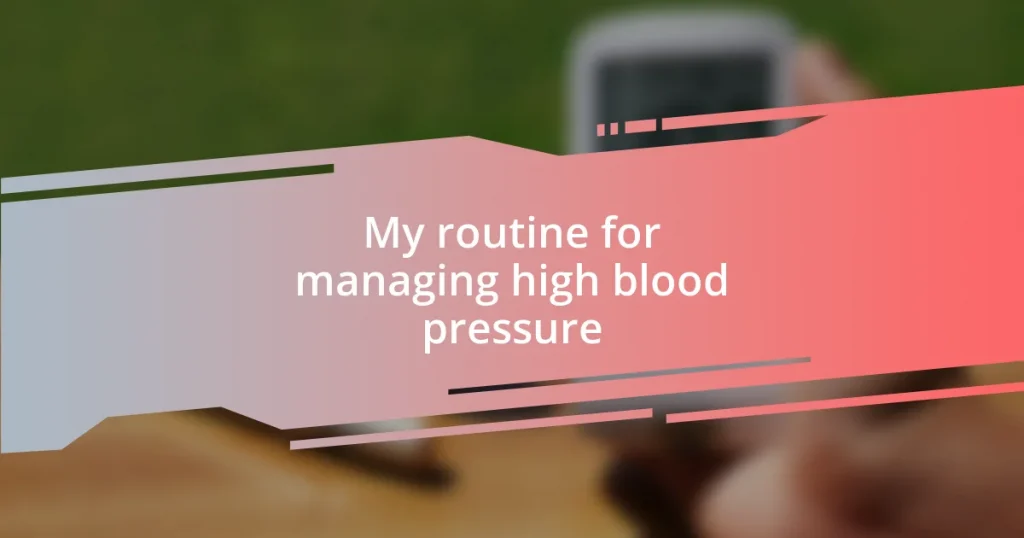Key takeaways:
- High blood pressure, or hypertension, is often asymptomatic, making regular check-ups and awareness of personal triggers essential for management.
- Dietary changes, consistent exercise, and effective stress management significantly contribute to lowering blood pressure and improving overall health.
- Monitoring blood pressure at home and consulting healthcare professionals are vital steps for tailoring strategies and maintaining accountability in managing hypertension.
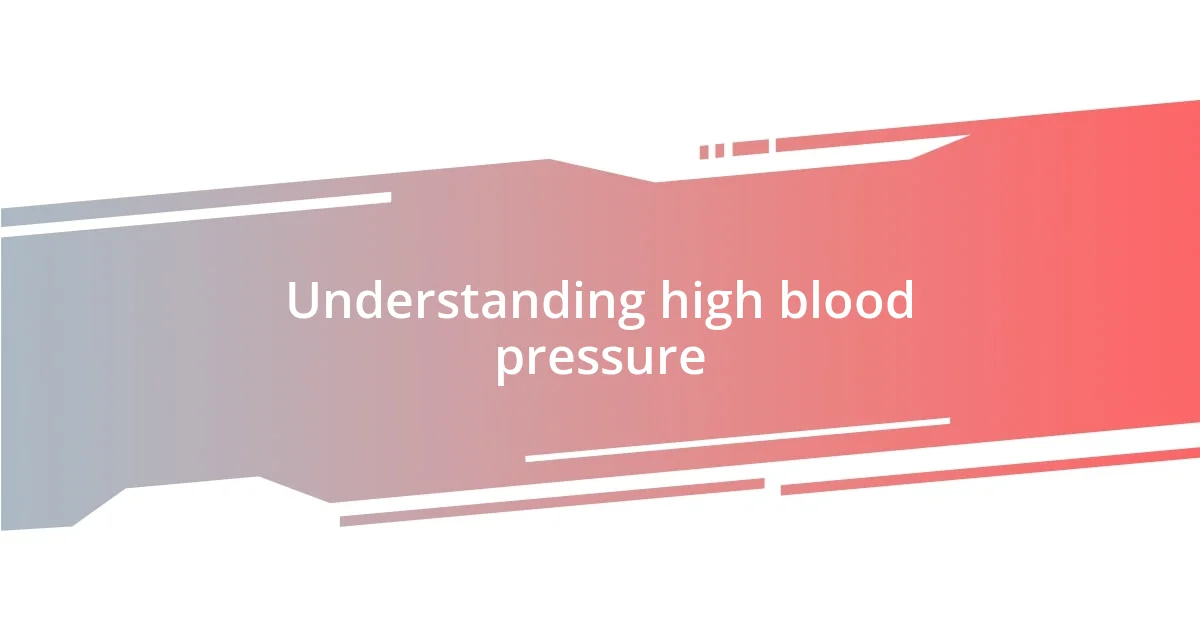
Understanding high blood pressure
High blood pressure, often called hypertension, is a common yet silent condition that can quietly wreak havoc on your health. I remember learning about my own blood pressure readings during a routine check-up; I was shocked to see numbers that were higher than normal. It made me wonder how many people overlook something so crucial, thinking, “It won’t happen to me.”
Understanding this condition means recognizing its potential to lead to serious complications like heart disease and stroke. As I delved deeper into my research, I discovered that anxiety plays a role in elevation. I found myself reflecting on moments of stress in my life—those busy days when my heart raced not just from physical activity but emotional pressure as well. How often do we ignore the signs, thinking they’re just part of our daily grind?
Another key insight is that hypertension typically develops over many years, often without obvious symptoms, which is why it’s often referred to as a “silent killer.” When I first heard that phrase, it struck a chord with me. Do we really understand what it means to live with this quiet threat? To me, it’s a reminder of the importance of regular check-ups and a proactive approach to health—a commitment I’ve made to ensure I don’t ignore the signals my body sends me.
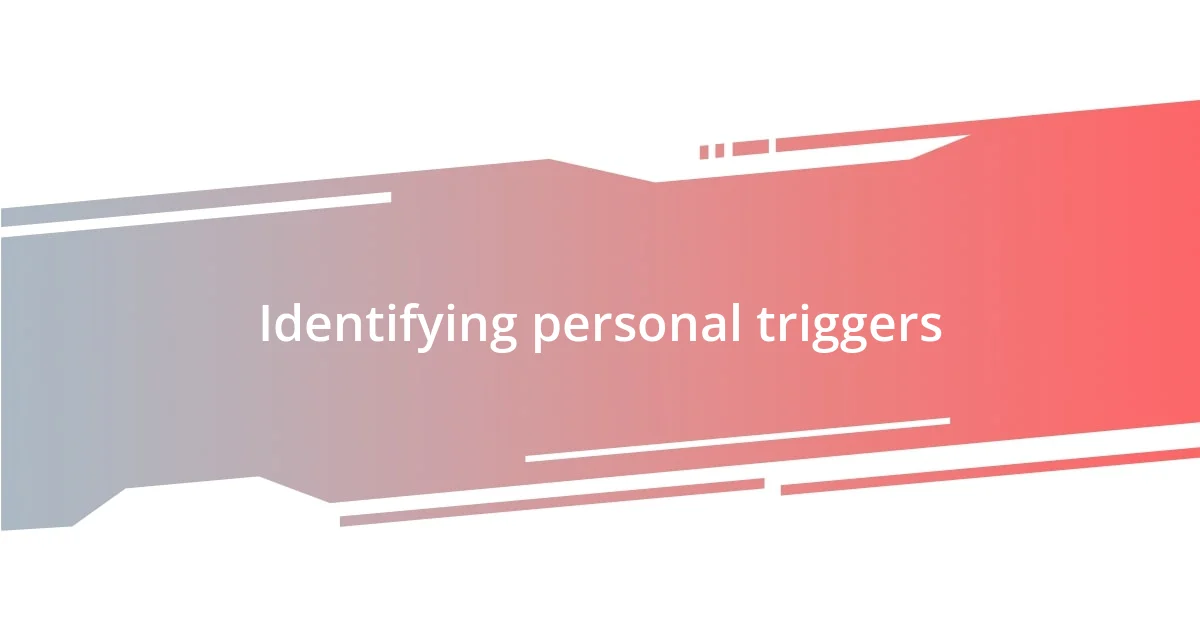
Identifying personal triggers
Identifying personal triggers for high blood pressure is crucial in managing this silent condition. I recall one particularly stressful week at work, where my blood pressure spiked due to tight deadlines and endless meetings. It was a wake-up call for me; I realized that recognizing these triggers—like stress or certain foods—was vital to maintaining a healthy lifestyle.
Sometimes, it’s the smallest changes that reveal the biggest impacts. For example, I noticed that after indulging in salty snacks during movie nights, my body reacted negatively the next day. Keeping a diary helped me connect the dots, making me more aware of how my choices influenced my well-being. Tracking these patterns turned my awareness into actionable steps, allowing me to adjust my routine accordingly.
Communication can also play a big part in managing triggers. I remember discussing my findings with friends and family; sharing my experiences not only helped me but also encouraged them to pay closer attention to their own health. Have you ever talked about your triggers with someone close? It can provide clarity and even support in your journey toward healthier living.
| Trigger Type | Example |
|---|---|
| Stress | Work deadlines and personal challenges |
| Diet | High-sodium snacks, processed foods |
| Lack of Sleep | Not getting enough restful sleep |
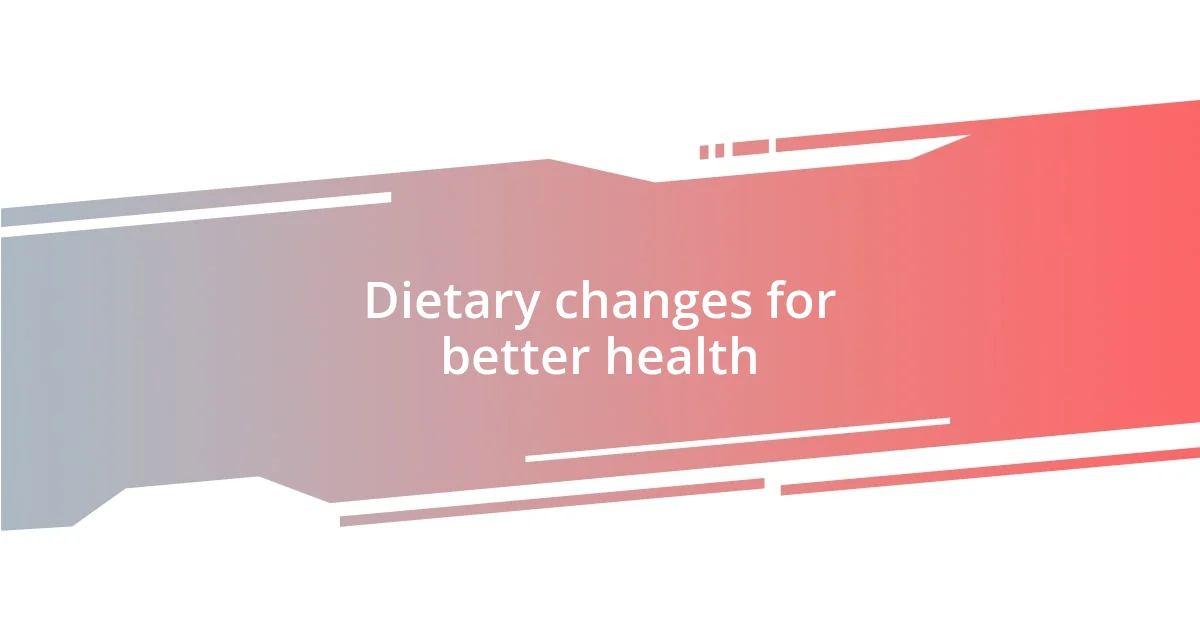
Dietary changes for better health
Making dietary changes has been one of the most impactful steps in my journey to manage high blood pressure. I vividly remember the first time I decided to overhaul my eating habits—standing in the produce aisle, surrounded by colorful fruits and vegetables, I felt a surge of hope. Swapping out processed snacks for fresh alternatives brought not only a physical change but also a mental shift. It wasn’t just about lowering my blood pressure; it was about embracing a vibrant, healthier lifestyle.
Here are some dietary adjustments that can make a significant difference:
- Increase fruits and vegetables: Aim for a variety, as they are rich in potassium and fiber.
- Limit sodium intake: Reducing added salt can help lower blood pressure; I found my taste buds adjusting quickly.
- Choose whole grains: Whole grains like brown rice and oats are a healthier alternative that I now prefer.
- Incorporate healthy fats: Foods like avocados and nuts provide heart-healthy fats.
- Stay hydrated: Drinking enough water has become a refreshing ritual for me.
- Watch alcohol consumption: I learned that moderating my intake can have a positive effect on my blood pressure.
By choosing to focus on these simple yet impactful dietary changes, I’ve created a routine that contributes not only to better health but also to a sense of empowerment in managing my condition. It’s all about finding what works best for you and sticking with it.
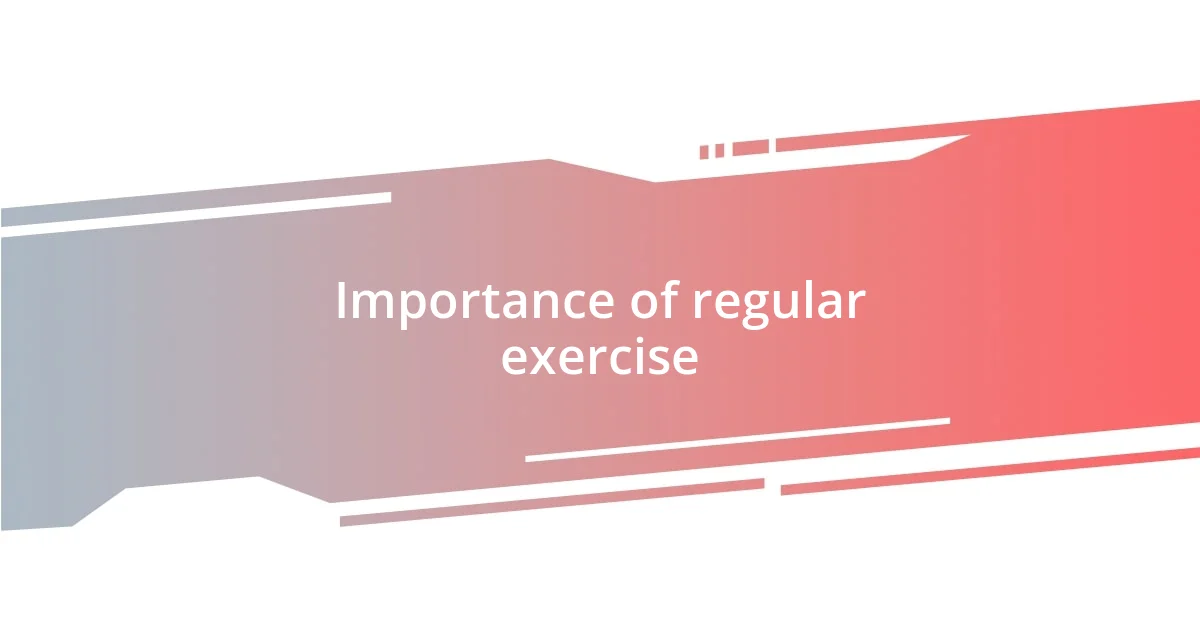
Importance of regular exercise
Regular exercise has played a fundamental role in my battle with high blood pressure. I remember those early mornings when I would lace up my sneakers, feeling a bit reluctant yet hopeful. Once I was out there, moving my body, I found an incredible release; those endorphins didn’t just elevate my mood—they helped lower my blood pressure, too. Have you ever noticed how a brisk walk can make everything feel a little better?
In my experience, consistency is key. At first, it felt challenging to carve out time for workouts amid life’s chaos. But once I established a routine, I realized it didn’t have to be all or nothing. Even short sessions of moderate exercise—like a 20-minute brisk walk or a quick home workout—made a measurable difference. I started to feel stronger and more energetic, and those small victories kept me motivated.
Moreover, I discovered that engaging in physical activities I genuinely enjoyed made all the difference. Swimming, dancing, and even gardening became part of my exercise repertoire. Every time I immersed myself in an activity I loved, I felt the stress melt away, reminding me that managing high blood pressure can be as much about enjoying life as it is about following a regimen. What activities excite you? I’ve come to believe that finding joy in movement can be a game changer for our health.
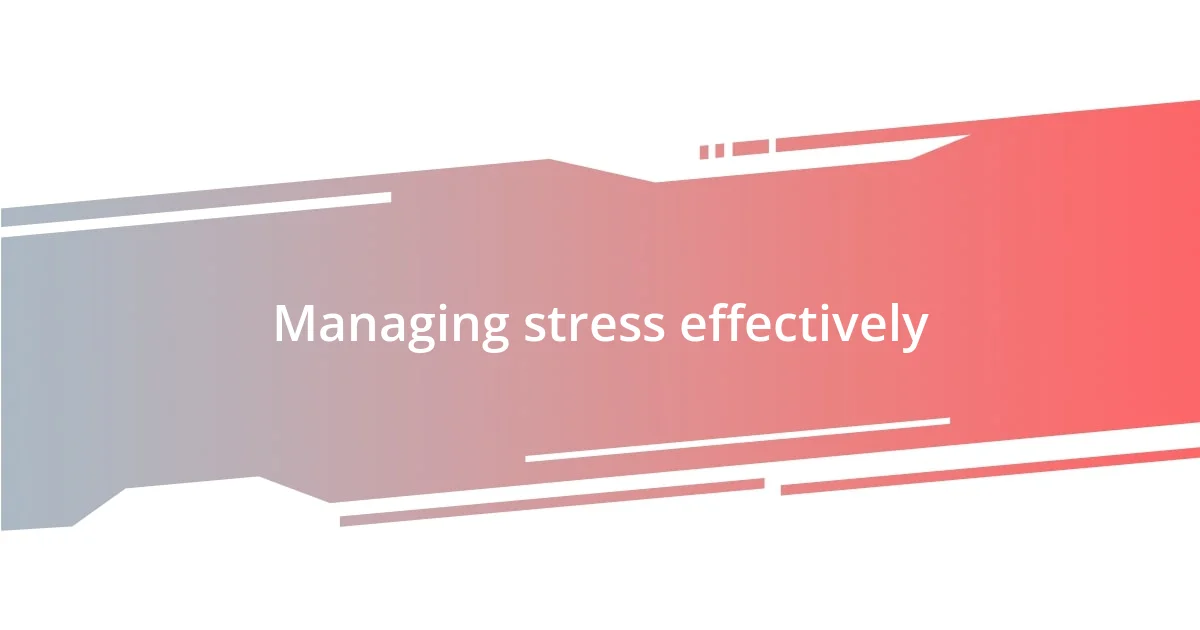
Managing stress effectively
Finding effective ways to manage stress has been pivotal for my overall well-being. I recall an afternoon when I sat quietly with my eyes closed, focusing on my breath. It was astonishing how just a few minutes of deep breathing helped ease the tightness in my chest and brought a wave of calm over me. Have you tried pausing like that during a hectic day?
Another method I’ve leaned on is mindfulness meditation. I remember my first attempt; my mind raced as I tried to quiet it. But over time, I’ve learned to simply observe those thoughts without judgment, allowing me to find clarity and composure. Even on days when anxiety creeps in, just a few minutes of meditation helps me regain control over my mind, reducing my overall stress levels. I often ask myself, “What small moment of peace can I create now?” This question has refocused my day, reminding me that it’s the little things that count.
Moreover, I’ve found that incorporating simple activities, like leisurely strolls in nature, can transform my mood. On a particularly stressful day, I took a walk under the trees, letting the gentle breeze wash over me. Just being outdoors, immersed in the symphony of rustling leaves and chirping birds, lifted my spirits tremendously. It’s these little connections to nature that remind me stress management doesn’t always have to be complicated; often, it’s about finding joy in everyday moments.
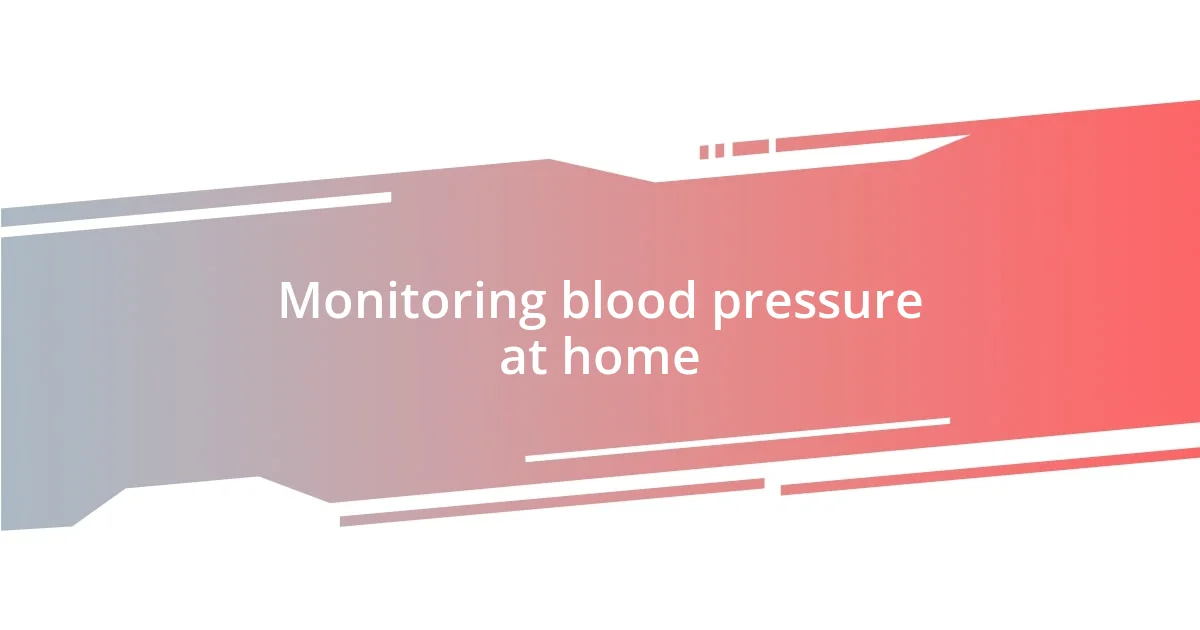
Monitoring blood pressure at home
When it comes to monitoring blood pressure at home, I believe having the right equipment is crucial. I remember when I first purchased my digital blood pressure cuff; it almost felt like a rite of passage. The initial readings surprised me, sparking a newfound awareness of how my lifestyle affected my numbers. Have you ever felt that jolt of realization when you see a number that hits home?
I typically check my blood pressure at the same time each day. This routine helps me track patterns and understand how different factors—like diet or stress—impact my readings. One evening after a particularly stressful day, I decided to do a quick check. Seeing slightly elevated numbers reminded me how vital it is to find time for relaxation. I wonder if daily monitoring encourages you to reflect on your emotional and physical well-being, too?
Moreover, I make it a point to keep a journal of my readings. This practice has turned into a motivating tool that encourages me to make healthier choices and keeps me accountable. I remember flipping back through my records to see how far I’ve come; those pages transformed numbers into a narrative of my health journey. How do you envision your progress? Writing down my journey helps me stay engaged and enthusiastic about my management routine.
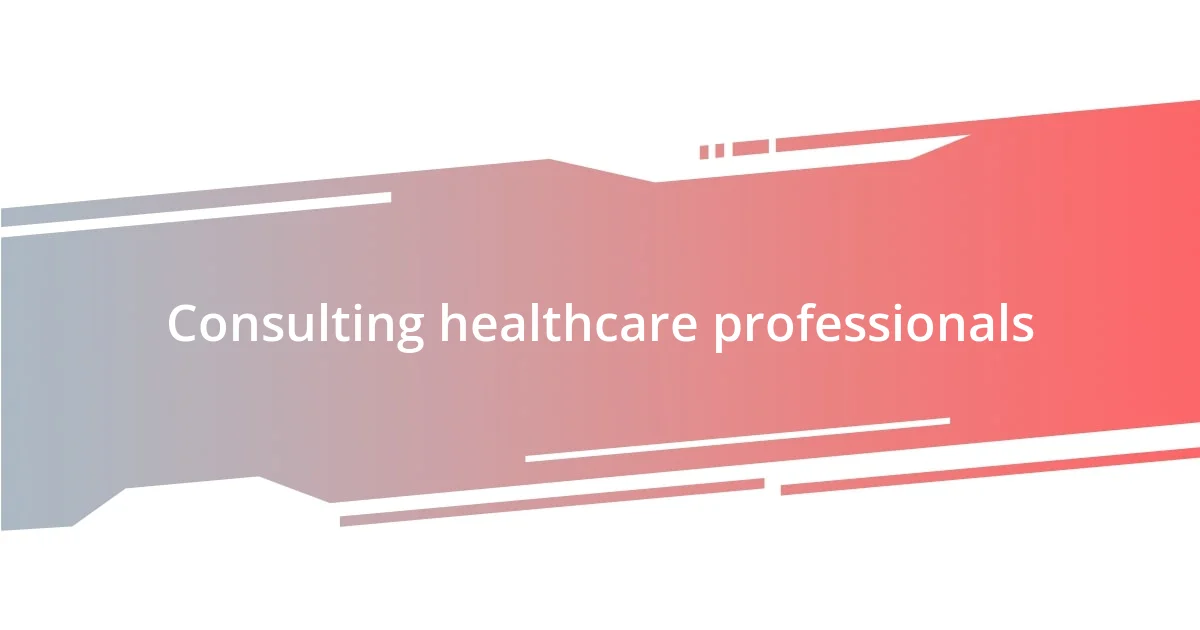
Consulting healthcare professionals
Consulting a healthcare professional is a critical step in managing high blood pressure. I vividly remember the first time I walked into my doctor’s office feeling anxious about my readings. The reassurance I received during that appointment highlighted the importance of professional guidance. Have you ever had a moment when expert advice changed your perspective on a health concern?
During my consultations, I learned that medication isn’t always the first option. My doctor introduced me to lifestyle modifications and their significant role in lowering blood pressure. Discussing my daily routine allowed us to tailor a plan that felt manageable. How often do you consider that your diet or exercise habits play a part in your health?
Regular follow-ups with my healthcare provider have kept me accountable. I value these moments of reflection where we assess progress and adjust our strategies. It can be enlightening to hear a medical professional’s insights after sharing my experiences, like when I mentioned my stress management techniques. A simple dialogue can lead to profound adjustments in my approach. Do you seek that kind of feedback in your health journey?










